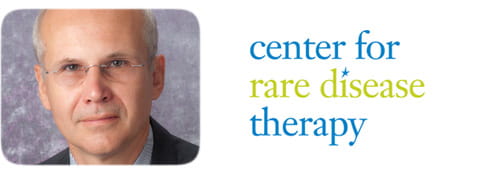
|
Chief, Bone Marrow Transplantation
and Cellular Therapies
|
Early in his career as a specialist in blood and bone marrow transplantation, Dr. Paul Szabolcs saw many patients with life-threatening illnesses, for whom a transplant might be curative, who were turned away because they were deemed too sick to withstand the intense chemotherapy needed to prepare their bodies for the transplant.
“I asked myself whether it was really necessary for every patient to receive such intense chemotherapy,” he recalls. “If we could reduce the intensity of pre-transplant chemotherapy, many more patients might benefit from transplantation.”
Since having this epiphany about a decade ago, Dr. Szabolcs has dedicated his career to developing effective “reduced-intensity” chemotherapy regimens for patients in need of a blood or bone marrow transplant, especially children with rare immune-system defects and degenerative brain diseases.
After graduating from medical school in 1985 in his native Hungary, Dr. Szabolcs completed a residency in pediatrics at Bellevue Hospital in New York and a fellowship in hematology (blood diseases), oncology (cancer), and bone marrow transplantation at Cornell University Medical College and Memorial Sloan-Kettering Cancer Center (MSKCC), also in New York. He is board certified in both pediatrics and pediatric hematology-oncology.
After academic appointments at MSKCC and The Rockefeller University in New York, Dr. Szabolcs spent 13 years at Duke University School of Medicine as an assistant and later associate professor of pediatrics. In 2011, he was appointed chief of the newly established Division of Blood and Marrow Transplantation and Cellular Therapies at UPMC Children's Hospital of Pittsburgh and professor of pediatrics at the University of Pittsburgh School of Medicine.
In Pittsburgh Dr. Szabolcs has further advanced his work on safer, less toxic chemotherapy regimens to prepare patients for blood or bone marrow transplants. “Here at Children’s we believe we have identified the level to which we can reduce the intensity of chemotherapy without increasing the risk of transplant rejection,” he says. “The regimen we have developed seems to be extremely well tolerated, even among children who have multiple infections or impaired lung, liver, or neurologic function.”
Dr. Szabolcs has also been a leader in the development of a new approach to blood transplantation that has enabled many more patients to benefit from this potentially life-saving therapy. Umbilical cord blood transplantation uses blood collected from the umbilical cord after a baby is born. Unlike bone marrow, cord blood does not need to be perfectly matched to the patient’s tissues. Also, cord blood can be frozen and stored until needed.
In addition, under Dr. Szabolcs’ leadership, Children’s now offers tandem lung and bone marrow transplantation to a subset of patients with inborn errors of immunity who have end-stage lung disease and require both new lungs and a new immune system. Both lungs and bone marrow must be collected from a compatible donor. The lung transplant is performed first, followed by the bone marrow transplant several weeks later. “This therapy is not offered anywhere else in the world as far as we know,” says Dr. Szabolcs.
Dr. Szabolcs also directs a National Institutes of Health–supported research program focused on developing strategies to help the immune system rebuild itself and reduce patients’ risk for viral infections after a cord blood transplant.
The Center for Rare Disease Therapy is unique, says Dr. Szabolcs, because it brings together the expertise of physicians and scientists from multiple disciplines with a single goal: to devise new and better treatments for children with rare diseases.
“We have scientists who study the biology of rare diseases, researchers who follow the natural history of these conditions, and transplant specialists who have the ability to design new, safer interventions,” he says. “To have this combination of specialists who work so well together is really unique and results in a comprehensive approach that pays attention to every aspect of these diseases.”









